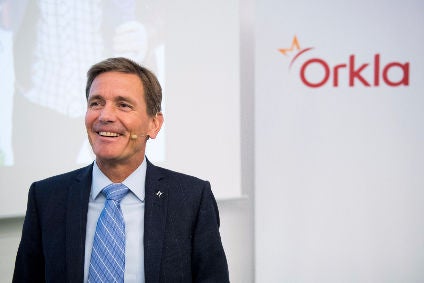
Orkla CEO Peter Ruzicka has said the Nordic consumer goods group wants to reduce the number of its factories to a level “very far” from the current 106 plants.
Ruzicka said Orkla had 97 factories when he joined the Grandiosa pizza and Toro desserts owner two years ago. Orkla has since announced plans to close 19 and so far had shut 11.

Discover B2B Marketing That Performs
Combine business intelligence and editorial excellence to reach engaged professionals across 36 leading media platforms.
However, due in part to recent acquisitions, Orkla has 106 factories. Speaking to analysts and investors at a conference in London, Ruzicka said Orkla wanted to “have as few factories as possible” as part of the company’s push to extract synergies from its operations and improve its profitability.
“We have far too many small factories producing more or less the same products. We need to get fewer factories with higher utilisation rates,” Ruzicka told the Sanford Bernstein European Strategic Decisions Conference in London. “The goal for us is to have as few factories as possible. The goal is to have factories with high-utilisation rates, much higher than we have today, and our long-term mission is to have one factory per category, or one factory per technology, in a specific geographic area. And whether that ends up with having 50 or 30 factories, I really cannot say, but it is very far from 106.”
A month later, Orkla outlined plans to close one of two plants in Rygge in south-eastern Norway and move production to a site in Sweden. However, in May, the company made a U-turn, insisting the closure could risk “impairing the company’s delivery performance”.

US Tariffs are shifting - will you react or anticipate?
Don’t let policy changes catch you off guard. Stay proactive with real-time data and expert analysis.
By GlobalDataRuzicka did not comment on specific factories at the conference but did outline why it can be a challenge to close plants in the Orkla network. “The complicated part about closing factories is that most of our factories are multi-category factories, meaning they not only produce ketchup, for example, but also some sauces and dressings, and so on. That means that you need to find new factories for that production, or you have to move categories between factories. In some cases, you may need to build a new production line or a new capacity in an existing factory to take the volume.”
During his presentation at the Sanford Bernstein conference, Ruzicka set out Orkla’s presence in the Nordic region and Baltic states but said the company wanted to “extract synergies” from that scale, through plant closures, wider operational improvements and through a programme he dubbed “One Orkla”.
Ruzicka said: “Orkla has substantial scale in its markets, and a wide range of really, really strong brands in the local markets. The way we operate means that generally we have the number one position, or a very strong number two position.
“Orkla is a result of a lot of acquisitions over time, and as a result we have very strong brands with local proximity in the markets. We do that very well. However, since we are the result of a lot of acquisitions, our supply chains are too complicated and too costly. We have to strengthen our capabilities. We also have to realise synergies from the scale of Orkla.
“If you look at how we have operated the businesses, we have made a lot of acquisitions, and we have had the philosophy that each business unit should operate as a completely independent unit, with its own supply chain and its own setup. That has led to a lot of inefficiencies, such as different IT systems, different supply chains, different logistics, different finance and accounting principles and so on. Now, we are implementing a One Orkla approach. This is a big difference.
“Going five years ahead, I want to have a culture of a unified “One Orkla”, and we are on that journey. This is a culture where we build on each other’s strengths, and we utilise all the competencies, capabilities and capacities in all parts of Orkla, regardless of geography or business area. That is what I really, really want and historically we haven’t done that.”





